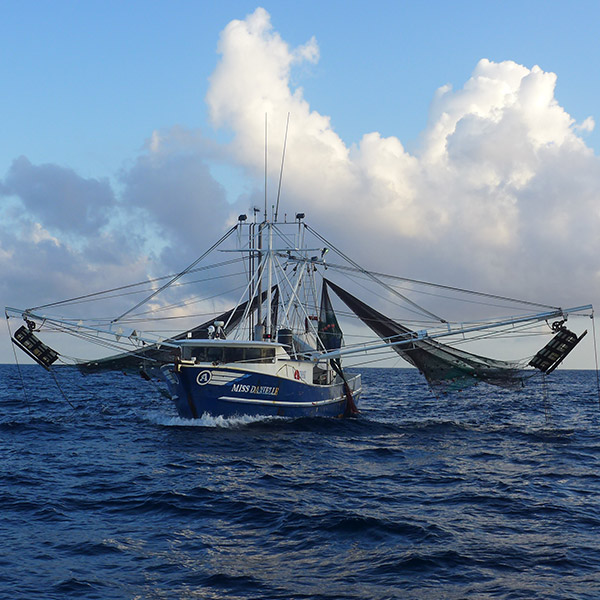Louisiana, Texas Sea Grants Helping Develop Better BRDs
This three-year, $2.48 million project will develop better bycatch reduction devices (BRDs) for the commercial shrimp industry in the Gulf of Mexico.
The Texas Sea Grant College Program is a collaboration of the National Oceanic and Atmospheric Administration (NOAA), the State of Texas and universities across the state.
Texas Sea Grant’s team includes administrative staff, program coordination, communications, and extension agents along the Texas coast.
Coastal Science. Community Solutions.
Peer-reviewed publications, resources, and materials.
Volunteer organization of citizens in science, workforce, and education advising on important matters related to TXSG.
Texas Sea Grant partners with many local, government, non-profit, education, and industry organizations.
Texas Sea Grant maintains an extensive network of partnerships spanning federal, state, regional, academic, non-profit, and industry sectors.
Texas Sea Grant’s open positions.
Supports healthy ecosystems by education and outreach, programming, and events on sustainable practices.
Supports development of innovative policies, institutional capacities, and management approaches that increase community resilience.
Promotes environmental literacy by supporting students and the workforce through the development of STEM educational programs, tools, and products.
Works to ensure safe, secure, and sustainable supplies of domestic seafood and decrease our reliance on seafood imports, and support healthy fish stocks and vibrant recreational fisheries
Texas Sea Grant’s outreach serves the communities and regions of the Texas coast. Science for the sustainable management and conservation of Texas’ coastal and marine resources is central to Texas Sea Grant’s mission.
Extension is a two-way transfer of knowledge between researchers and community stakeholders.
Providing science-based programs across all educational levels, enhancing STEM learning in marine-related fields.
Supports innovative, science-based solutions to address environmental, economic, and social challenges.
Texas Sea Grant welcomes the help of the community to help monitor, protect, and clean our coasts.
Trainings, Workshops, Advising, Certification and Technical Assistance.
Find out if Texas Sea Grant is hosting, attending, or leading an event in your area.
Texas Sea Grant supports marine- and coastal-related research at universities across the state through a competitive grant program.
Texas Sea Grant will continue to support cutting-edge research in the areas of marine-related energy sources, climate change, coastal processes, energy efficiency, hazards, storm water management and tourism.
Monthly Texas Sea Grant newsletter.
Get Hooked, quarterly Fisheries, Aquaculture, and Seafood newsletter
Annual magazine about education, outreach, and research supported by Texas Sea Grant.
The Texas Sea Grant College Program is a collaboration of the National Oceanic and Atmospheric Administration (NOAA), the State of Texas and universities across the state.
Texas Sea Grant’s team includes administrative staff, program coordination, communications, and extension agents along the Texas coast.
Coastal Science. Community Solutions.
Peer-reviewed publications, resources, and materials.
Volunteer organization of citizens in science, workforce, and education advising on important matters related to TXSG.
Texas Sea Grant partners with many local, government, non-profit, education, and industry organizations.
Texas Sea Grant maintains an extensive network of partnerships spanning federal, state, regional, academic, non-profit, and industry sectors.
Texas Sea Grant’s open positions.
Supports healthy ecosystems by education and outreach, programming, and events on sustainable practices.
Supports development of innovative policies, institutional capacities, and management approaches that increase community resilience.
Promotes environmental literacy by supporting students and the workforce through the development of STEM educational programs, tools, and products.
Works to ensure safe, secure, and sustainable supplies of domestic seafood and decrease our reliance on seafood imports, and support healthy fish stocks and vibrant recreational fisheries
Texas Sea Grant’s outreach serves the communities and regions of the Texas coast. Science for the sustainable management and conservation of Texas’ coastal and marine resources is central to Texas Sea Grant’s mission.
Extension is a two-way transfer of knowledge between researchers and community stakeholders.
Providing science-based programs across all educational levels, enhancing STEM learning in marine-related fields.
Supports innovative, science-based solutions to address environmental, economic, and social challenges.
Texas Sea Grant welcomes the help of the community to help monitor, protect, and clean our coasts.
Trainings, Workshops, Advising, Certification and Technical Assistance.
Find out if Texas Sea Grant is hosting, attending, or leading an event in your area.
Texas Sea Grant supports marine- and coastal-related research at universities across the state through a competitive grant program.
Texas Sea Grant will continue to support cutting-edge research in the areas of marine-related energy sources, climate change, coastal processes, energy efficiency, hazards, storm water management and tourism.
Monthly Texas Sea Grant newsletter.
Get Hooked, quarterly Fisheries, Aquaculture, and Seafood newsletter
Annual magazine about education, outreach, and research supported by Texas Sea Grant.
This three-year, $2.48 million project will develop better bycatch reduction devices (BRDs) for the commercial shrimp industry in the Gulf of Mexico.
Mar 1, 2021 By Louisiana Sea Grant
2 minutes

Texas Sea Grant
As part of a larger National Oceanic and Atmospheric Administration (NOAA) restoration project, Louisiana Sea Grant and Texas Sea Grant are collaborating on a three-year, $2.48 million project to find and develop better bycatch reduction devices (BRDs) for the commercial shrimp industry in the Gulf of Mexico. The project begins this year.
“The primary goal is to reduce commercial shrimp trawl fishing pressure on finfish populations to restore fish affected by the Deepwater Horizon oil spill,” said Julie Lively, Louisiana Sea Grant (LSG) and LSU AgCenter fisheries specialist, and the lead for the LSG side of the project. “Another goal is to identify improved BRD technologies that are more efficient for the shrimp industry with improved shrimp retention, cost and use.”
Engaging shrimp industry members during implementation of the project is one of the first tasks. “Utilizing industry knowledge and expertise is critical to the project’s success. And we plan to create a stakeholder working group to provide input throughout the life of the project,” said Lively.
Another early task will have NOAA searching the globe to find different types of BRDs used elsewhere in the world that could possibly work in the Gulf. Shrimpers across the Gulf also will be surveyed for their BRD ideas, asked about current BRD usage and their willingness to accept and use new equipment.
NOAA is expected to test prospective new BRDs in Florida beginning in the summer. Later in the year, and possibly through 2023, shrimpers across the Gulf can apply to test gear and provide feedback and recommendations. The final phase of the project calls for creating a Gulf-wide roll-out plan for new BRDs, which includes an incentives strategy, and then monitoring BRD use to ensure they’re having a positive impact on finfish populations.
Throughout the project, a variety of BRD trainings will be offered to shrimpers. And training materials will be made available in English, Spanish and Vietnamese.
By Louisiana Sea Grant, Original Article
